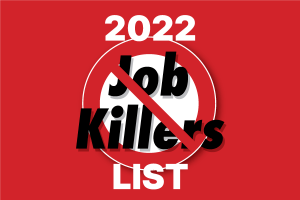 Seven California Chamber of Commerce job killer proposals have moved on to the second house, passing a key legislative deadline on May 27 that required nontax-related bills to pass out of the house in which they were introduced.
Seven California Chamber of Commerce job killer proposals have moved on to the second house, passing a key legislative deadline on May 27 that required nontax-related bills to pass out of the house in which they were introduced.
Remaining Job Killer Bills
The following seven bills passed the house of origin deadline on Friday:
Labor and Employment
- AB 2183 (Stone; D-Scotts Valley) Forced Unionization Process for Agricultural Employees. Limits an employee’s ability to independently and privately vote for unionization in the workplace, by essentially eliminating a secret ballot election and replacing it with the submission of representation cards signed by over 50% of the employees, which leaves employees susceptible to coercion and manipulation by labor organizations. Also, unfairly limits an employer’s ability to challenge the cards submitted by forcing employers to post an unreasonable bond, and then limits an employee’s ability to decertify a union, by forcing them to go through the ballot election process instead of submission of representation cards. Also includes an unnecessary presumption of retaliation that is effectively unlimited in scope because it would apply for the duration of an election campaign, which could last for a year or more.
- AB 2188 (Quirk; D-Hayward) Limits Employers’ Ability to Keep Workplace Drug-Free. Risks workplace safety by promoting marijuana use to a protected class under California’s discrimination law, on par with national origin or religion. Also effectively prohibits pre-employment drug testing, harming employers’ ability to keep their workplace safe and drug free. In addition, would prohibit use of traditional marijuana tests, such as urine and hair testing, and compel employers to utilize saliva-based testing.
- SB 1044 (Durazo; D-Los Angeles) State of Emergency. Allows employees to leave work or refuse to show up to work if employee feels unsafe regardless of existing health and safety standards or whether employer has provided health and safety protections and subjects employers to costly PAGA lawsuits if they dispute the employee’s decision or need to have another employee take over any job duties.
- SB 1162 (Limón; D-Goleta) Publication of Pay Data. Encourages litigation against employers based on the publication of broad, unreliable data collected by the state. Undermines employers’ ability to hire, imposes burdensome administrative and record keeping requirements, and subjects employers to a private right of action and penalties under the Private Attorneys General Act (PAGA).
CEQA
- AB 1001 (Garcia, Cristina; D-Los Angeles) Expands CEQA and Hurts Housing. Creates new highly subjective, non-quantifiable and litigation-bait standards in CEQA that will threaten California’s economic recovery and ability to construct much needed housing. It also removes local government discretion regarding how to analyze and mitigate proposed project impacts, thereby making projects more expensive, harder to build and more likely to be thrown into courts by NIMBY opposition.
- AB 2840 (Reyes; D-San Bernardino) Warehouse and Logistics Project Ban. Circumvents the California Environmental Quality Act, creates an unprecedented ban on warehouses and logistics use projects irrespective of whether there are any project impacts, usurps local authority over land use decisions, exacerbates supply chain problems, and forces union labor for proposed private projects that are not banned.
Workers’ Compensation
- SB 213 (Cortese; D-San Jose) Workers’ Compensation Presumption. Expands Costly Presumption of Injury. Significantly increases workers’ compensation costs for public and private hospitals by presuming certain diseases and injuries are caused by the workplace and establishes an extremely concerning precedent for expanding presumptions into the private sector.


